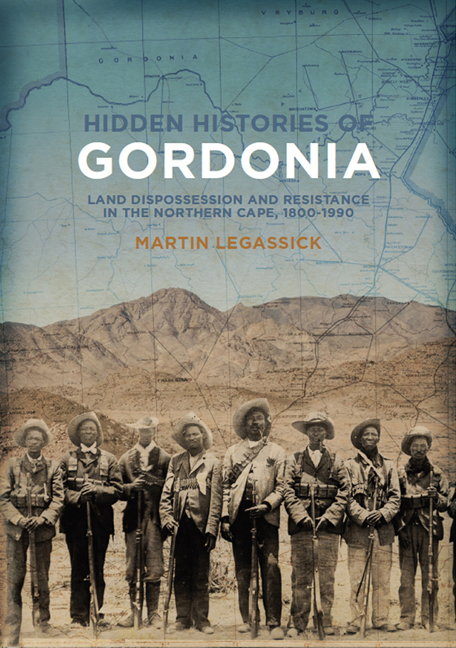Book contents
- Frontmatter
- Dedication
- Contents
- Acknowledgements
- Acronyms and abbreviations
- Illustrations
- Preface
- Chapter 1 The prehistory of Gordonia
- Chapter 2 The Baster settlement of Gordonia and its decline
- Chapter 3 The will of Abraham and Elizabeth September: a struggle for land in Gordonia, 1898–2014
- Chapter 4 From prisoners to exhibits: representations of Bushmen of the northern Cape, 1880–1900
- Chapter 5 South African human remains and the politics of repatriation: reconsidering the legacy of Rudolf Pöch
- Chapter 6 The early history of the brown Afrikaners in Riemvasmaak
- Chapter 7 The battle of Naroegas
- Chapter 8 The Marengo rebellion and Riemvasmaak, 1903–1907
- Chapter 9 The racial division of Gordonia, 1921–1930
- Chapter 10 Keidebees and Blikkies locations, Upington, 1894–1974
- Chapter 11 ‘All my powers have been swallowed by Upington’: the life and times of Alfred Gubula
- References
- Index
Chapter 4 - From prisoners to exhibits: representations of Bushmen of the northern Cape, 1880–1900
Published online by Cambridge University Press: 20 April 2018
- Frontmatter
- Dedication
- Contents
- Acknowledgements
- Acronyms and abbreviations
- Illustrations
- Preface
- Chapter 1 The prehistory of Gordonia
- Chapter 2 The Baster settlement of Gordonia and its decline
- Chapter 3 The will of Abraham and Elizabeth September: a struggle for land in Gordonia, 1898–2014
- Chapter 4 From prisoners to exhibits: representations of Bushmen of the northern Cape, 1880–1900
- Chapter 5 South African human remains and the politics of repatriation: reconsidering the legacy of Rudolf Pöch
- Chapter 6 The early history of the brown Afrikaners in Riemvasmaak
- Chapter 7 The battle of Naroegas
- Chapter 8 The Marengo rebellion and Riemvasmaak, 1903–1907
- Chapter 9 The racial division of Gordonia, 1921–1930
- Chapter 10 Keidebees and Blikkies locations, Upington, 1894–1974
- Chapter 11 ‘All my powers have been swallowed by Upington’: the life and times of Alfred Gubula
- References
- Index
Summary
In my opinion it would be useless to attempt to get a conviction against these [Bush]men for the crimes they have committed or been accessory to. The Evidence necessary if [it] ever existed has now disappeared…To place them in service even far from here in the Colony would be of little avail as even if they stayed quietly for a time when the wild fit came over them they would make for the [Orange River] Islands again. The only suitable place for them is Robben Island… It is probable that feeling they could not get over the sea they would settle down contentedly and I think would earn their keep and wages. They would also be available for Bushman lore researches…
– J.H. Scott, 1881The author of these words, John Scott, was appointed special magistrate on the northern border of the Cape Colony in 1880 and served there until 1887. In presiding over the Baster settlement established in Gordonia, amongst his duties was dealing with the Bushman inhabitants of the area. Through an examination of his relations with Bushmen it is possible to see the transformation of Scott's Cape liberal ideology into one approximating turn-of-the-century racism. Imprisoning them for breaches of colonial law, essentially because the Bushmen refused to become a part of the cheap black labour force required by the colony, Scott also became involved in organising them as objects of ethnographic research and objects of exhibit and display.
In his book The Birth of the Museum, Tony Bennett takes issue with Douglas Crimp for describing the museum as another Foucaultian ‘institution of confinement’. While the museum and the prison are both articulations of power and knowledge relations, the museum, he insists, is an institution not of confinement but of exhibition. In contrast to the withdrawal of objects and bodies from the public gaze, ‘[the] institutions comprising the “exhibitionary complex”… were involved in the transfer of objects and bodies from the enclosed and private domains in which they had previously been displayed… into progressively more open and public arenas where, through the representations to which they were subjected, they formed vehicles for inscribing and broadcasting the messages of power’.
- Type
- Chapter
- Information
- Hidden Histories of GordoniaLand dispossession and resistance in the Northern Cape, 1800–1990, pp. 123 - 146Publisher: Wits University PressPrint publication year: 2016

